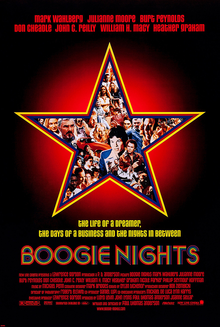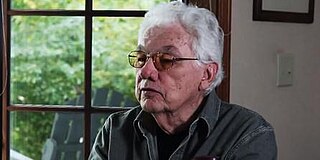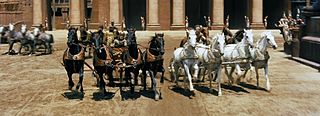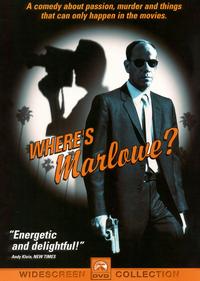
Conrad Lafcadio Hall, ASC was a French Polynesian-born American cinematographer. Named after writers Joseph Conrad and Lafcadio Hearn, he became widely prominent as a cinematographer earning numerous accolades including three Academy Awards, three BAFTA Awards and five American Society of Cinematographers Awards.

Paul Thomas Anderson, also known by his initials PTA, is an American filmmaker. His accolades include a BAFTA Award, and nominations for eleven Academy Awards and three Golden Globe Awards. He has also won Best Director at the Cannes Film Festival, the Silver Lion at the Venice Film Festival, and both the Silver and Golden Bear at the Berlin Film Festival.

Boogie Nights is a 1997 American period drama film written, directed, and co-produced by Paul Thomas Anderson. It is set in Los Angeles's San Fernando Valley and focuses on a young nightclub dishwasher who becomes a popular star of pornographic films, chronicling his rise in the Golden Age of Porn of the 1970s through his fall during the excesses of the 1980s. The film is an expansion of Anderson's mockumentary short film The Dirk Diggler Story (1988), and stars Mark Wahlberg, Julianne Moore, Burt Reynolds, Don Cheadle, John C. Reilly, William H. Macy, Philip Seymour Hoffman, and Heather Graham.

Hard Eight is a 1996 American crime film written and directed by Paul Thomas Anderson in his feature directorial debut, and starring Philip Baker Hall, John C. Reilly, Gwyneth Paltrow and Samuel L. Jackson. It is the expansion of the short film Cigarettes & Coffee. The film follows the life of a senior gambler and a homeless man. It premiered at the 1996 Cannes Film Festival.

Coffee and Cigarettes is the title of three short films and a 2003 feature-length anthology film by independent film director Jim Jarmusch. The feature film consists of 11 short stories which share coffee and cigarettes as a common thread, and includes the earlier three short films.

Philip Baker Hall was an American character actor. He is known for his collaborations with Paul Thomas Anderson, including Hard Eight (1996), Boogie Nights (1997), and Magnolia (1999). He also starred in leading roles in films, such as Secret Honor (1984) and Duck (2005). Hall had supporting roles in many films, including Midnight Run (1988), Say Anything... (1989), The Truman Show (1998), The Talented Mr. Ripley (1999), The Insider (1999), The Contender (2000), Bruce Almighty (2003), Dogville (2003), Zodiac (2007), 50/50 (2011), and Argo (2012). He received an Independent Spirit Award nomination for Best Male Lead for his role in Hard Eight and two Screen Actors Guild Award nominations for Outstanding Performance by an Ensemble Cast in a Motion Picture for Boogie Nights and Magnolia.

Jack Cardiff was a British cinematographer, film and television director, and photographer. His career spanned the development of cinema, from silent film, through early experiments in Technicolor, to filmmaking more than half a century later.

Philip H. Lathrop, A.S.C. was an American cinematographer noted for his skills with wide screen technology and detailed approach to lighting and camera placement. He spent most of his life in movie studios. Lathrop was known for such films as Touch of Evil (1958), Lonely Are the Brave (1962), The Americanization of Emily (1964), The Cincinnati Kid (1965), Point Blank (1967), Finian's Rainbow (1968), The Traveling Executioner (1970), Portnoy's Complaint (1972), Earthquake (1974), Swashbuckler (1976), The Driver (1978), Moment by Moment (1978), A Change of Seasons (1980), Foolin' Around (1980), Loving Couples (1980), and Deadly Friend (1986).
William Kirk Baltz is an American actor, best known for his role as police officer Marvin Nash in American filmmaker Quentin Tarantino's 1992 film Reservoir Dogs.
Thomas A. DiCillo is an American film director, screenwriter, cinematographer, and musician.

Gordon Hugh Willis Jr., ASC was an American cinematographer and film director. He is best known for his photographic work on eight Woody Allen films, six Alan J. Pakula films, four James Bridges films, and all three films from Francis Ford Coppola's The Godfather series.

Ultra Panavision 70 and MGM Camera 65 were, from 1957 to 1966, the marketing brands that identified motion pictures photographed with Panavision's anamorphic movie camera lenses on 65 mm film. Ultra Panavision 70 and MGM Camera 65 were shot at 24 frames per second (fps) using anamorphic camera lenses. Ultra Panavision 70 and MGM Camera 65's anamorphic lenses compressed the image 1.25 times, yielding an extremely wide aspect ratio of 2.76:1.
"Man from the South" is a short story by Roald Dahl originally published as "Collector's Item" in Collier's in September 1948. It has been adapted several times for television and film, including a 1960 version that aired as an episode of Alfred Hitchcock Presents, and starred Steve McQueen, Neile Adams, and Peter Lorre.

Where's Marlowe? is a 1998 American mockumentary mystery black comedy film written by Daniel Pyne and John Mankiewicz. Daniel Pyne also directed the film, which stars Miguel Ferrer, Mos Def, John Slattery, and John Livingston.

William Eubank is an American film director, screenwriter and cinematographer. On his first feature film, Love, released in 2011, in addition to directorial and director of photography duties, Eubank also served as production designer. His second feature film, The Signal, premiered at the 2014 Sundance Film Festival and was released in theaters by Focus Features on June 13, 2014. His third feature film, the science-fiction horror film Underwater, was released in January 2020 by 20th Century Fox.

Lay the Favorite is a 2012 American comedy-drama film directed by Stephen Frears and written by D.V. DeVincentis, and stars Bruce Willis, Rebecca Hall, Catherine Zeta-Jones and Joshua Jackson. Based on Beth Raymer's 2010 memoir of the same name, the film follows a young, free-spirited woman as she journeys through the legal and illegal world of sports gambling.
Haris Zambarloukos, B.S.C. is a Greek-Cypriot cinematographer. He is best known for his work on films such as Venus (2006), Sleuth (2007), Mamma Mia! (2008), Thor (2011), and Belfast (2021).
Martin Hill is a former camera man who collects antique cameras, reels and other various filmmaking equipment. After making a few films, Hill decided to collect cameras instead. At one point he owned the Panavision PSR 35mm that George Lucas used to film the first Star Wars movie, which eventually sold for over $600,000. His collection included cameras that filmed blockbusters such as Gone With the Wind, The Grapes of Wrath, and Butch Cassidy and the Sundance Kid. He also once owned the camera used for most of Charlie Chaplin's silent movies.

The Lie is a 2011 American drama-comedy film, directed by Joshua Leonard, from a screenplay by Leonard, Jess Weixler, Mark Webber, and Jeff Feuerzeig. It is based upon a short story of the same name by T. Coraghessan Boyle, which was printed in The New Yorker. It stars Leonard, Weixler, Webber, Kelli Garner, Jane Adams, Alia Shawkat, Gerry Bednob, Holly Woodlawn, Kirk Baltz, Tipper Newton and Violet Long.
Thimios Bakatakis is a Greek cinematographer. He has served as a cinematographer for various feature films, short films, music videos, and commercials, often collaborating with director Yorgos Lanthimos on his projects.














